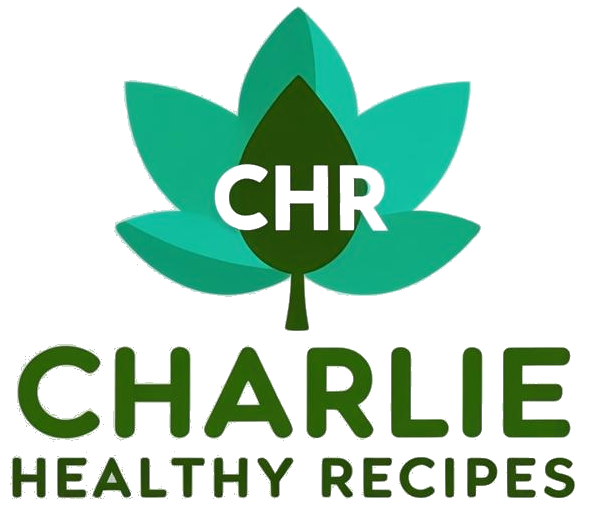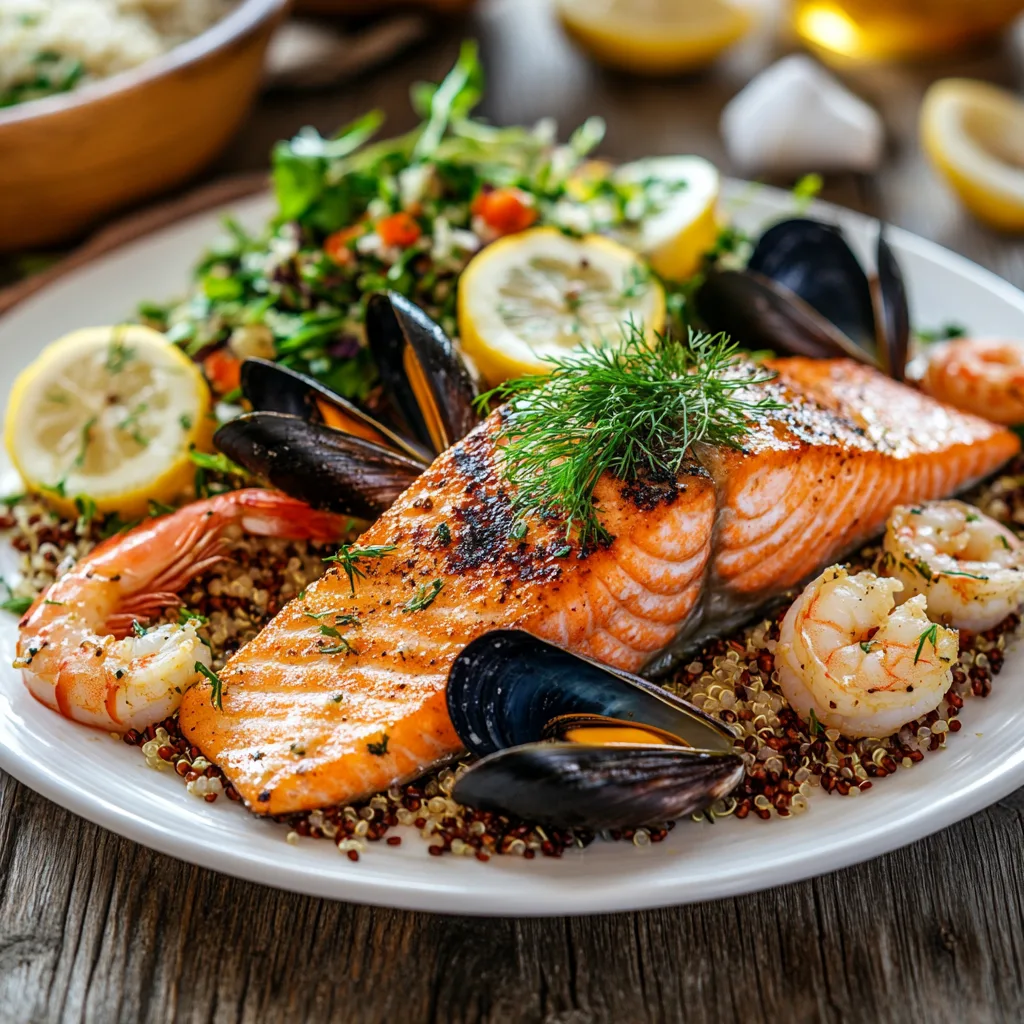Seafood has long been celebrated across the globe for its remarkable health benefits. From the Mediterranean coastlines to the traditional Japanese diet, incorporating fish and shellfish has been a cornerstone of nutrition and longevity. But what exactly makes seafood so healthy?
According to the cardiovascular benefits of seafood outlined by the American Heart Association, regular consumption of fish reduces the risk of heart disease and supports brain health. Moreover, seafood is a critical source of essential nutrients often lacking in the standard Western diet.
In this guide, we’ll explore the nutritional secrets behind seafood, debunk common myths, and recommend delicious, sustainable choices — plus highlight delicious recipes like a Mediterranean salmon bowl rich in omega-3s.
🐟 Nutritional Powerhouse: What Makes Seafood Stand Out?
High-Quality Protein
Seafood provides complete proteins — meaning it contains all nine essential amino acids necessary for muscle repair, immune support, and hormone production. It’s comparable in quality to meat and poultry but often lighter and easier to digest.
Rich in Omega-3 Fatty Acids
Fatty fish like salmon, sardines, and mackerel are loaded with EPA and DHA — potent omega-3 fatty acids. As the Harvard School of Public Health highlights about omega-3s in seafood, these compounds help reduce inflammation, protect against heart disease, and support cognitive health.
Vitamins and Minerals Galore
- Vitamin D: Crucial for bone health and immune function.
- Vitamin B12: Supports nerve health and energy metabolism.
- Iodine: Essential for thyroid regulation.
- Selenium: Acts as an antioxidant, protecting cells from damage.
—
🧠 How Seafood Supports Brain Health
Research consistently shows that diets rich in fatty fish are linked to lower rates of cognitive decline, improved memory, and reduced risk of conditions like Alzheimer’s disease.
- EPA and DHA: Help form cell membranes in the brain.
- Omega-3s: Reduce brain inflammation and promote neuron communication.
- Pregnancy benefits: Maternal seafood intake supports fetal brain and eye development.
Try pairing your next brain-boosting meal with healthy sides like a nutrient-packed comfort food like healthy soups!
—
❤️ Seafood and Heart Health: A Perfect Match
- Reduces risk of heart attacks and strokes.
- Lowers triglyceride levels naturally.
- Maintains healthy blood pressure and heart rhythms.
Eating just 1–2 servings of fatty fish per week can reduce heart disease risk by up to 36%, according to the American Heart Association.
—
⚡ Seafood for Weight Management
- High satiety: Keeps you feeling full longer without excess calories.
- Low calorie-density: Especially in white fish like cod, haddock, and tilapia.
- Boosts metabolism: Lean proteins promote thermogenesis.
Healthy pasta dishes like this healthy and satisfying seafood pasta alternative can keep your meals balanced and delicious.
👁️ Seafood for Eye, Skin, and Joint Health
Beyond brain and heart health, seafood is a powerful ally for your vision, complexion, and joints. Its unique mix of nutrients works at the cellular level to prevent chronic conditions and signs of aging.
Eye Health
- Omega-3s help protect against age-related macular degeneration (AMD).
- Shellfish like oysters are rich in zinc, which supports retina function.
Skin Health
- Fatty acids improve skin hydration and elasticity.
- Selenium and vitamin E from fish protect against oxidative damage.
Joint Support
- Anti-inflammatory properties relieve stiffness in arthritis and autoimmune conditions.
- Regular consumption may reduce the need for NSAIDs (nonsteroidal anti-inflammatory drugs).
⚠️ Mercury in Seafood: What You Need to Know
While seafood is nutrient-rich, some types may contain traces of mercury and other heavy metals. The key is knowing which types to enjoy regularly — and which to limit.
Low-Mercury, Safe Options
- Salmon
- Sardines
- Trout
- Pollock
- Anchovies
Fish to Limit (High Mercury)
- Shark
- King Mackerel
- Tilefish (from the Gulf of Mexico)
- Bigeye Tuna
- Marlin
Special Considerations
Pregnant women and young children should follow guidelines from the FDA and EPA regarding weekly intake. Limiting high-mercury fish while still getting omega-3s is essential during pregnancy and early development.
—
🌱 Sustainable Seafood: Eating with the Planet in Mind
Making seafood part of your diet doesn’t just benefit your health — it can support the planet too, when sourced responsibly. Overfishing, pollution, and habitat loss threaten global fish populations. But there are tools to help make smarter choices.
How to Choose Sustainable Seafood
- Look for certification logos like MSC (Marine Stewardship Council) or ASC (Aquaculture Stewardship Council).
- Use the sustainable seafood recommendations from Seafood Watch to guide your purchasing decisions.
- Favor wild-caught fish from well-managed fisheries or farm-raised fish from clean systems.
Eco-Friendly Tips
- Buy local, seasonal seafood to reduce carbon footprint.
- Ask your fishmonger about the origin and fishing method.
- Try lesser-known fish (like hake or mackerel) to ease pressure on popular stocks.
—
✅ Up next in **Part 3**:
– 📌 FAQs based on People Also Ask
– 📈 SEO keywords (LSI/NLP)
– 📝 Final takeaway & call to action
❓ Frequently Asked Questions About Seafood and Health
Is eating seafood every day healthy?
Yes, in moderation. Most health experts recommend eating seafood 2–3 times a week. If you choose low-mercury fish like salmon, sardines, and shrimp, daily consumption can be safe and beneficial, especially when paired with a balanced diet.
What is the healthiest seafood to eat?
Fatty fish like salmon, trout, and sardines top the list due to their high omega-3 content, vitamin D, and low mercury levels. Shellfish such as oysters and mussels are also packed with zinc and iron.
Does seafood help lower cholesterol?
Yes. Omega-3 fatty acids in seafood reduce triglycerides and improve HDL (good) cholesterol, making them a heart-healthy alternative to red meat and processed foods.
Can seafood help with weight loss?
Absolutely. Seafood is rich in high-quality protein that promotes satiety and lean muscle development, helping you stay full longer while consuming fewer calories overall.
Is seafood better than red meat?
In many ways, yes. Seafood is generally lower in saturated fat and cholesterol, and it’s easier to digest. Swapping steak for salmon even once a week can support heart and brain health.
—
🔍 SEO LSI & NLP Keyword Suggestions
Sprinkle these throughout your article for better discoverability:
- omega-3 benefits
- seafood nutrition facts
- best fish for heart health
- low mercury fish list
- seafood and brain development
- healthy fish recipes
- sustainable fish sources
- epa and dha benefits
- lean protein seafood
- seafood diet for weight loss
—
📚 Final Thoughts: Why Seafood Deserves a Place on Your Plate
From heart health to cognitive clarity, from glowing skin to reduced inflammation, the reasons why seafood is so healthy are backed by science, tradition, and flavor. With the right sourcing, it’s not just good for you — it’s good for the planet.
Whether you’re enjoying a classic salmon fillet, a refreshing Mediterranean salmon bowl, or a creative dish like creamy artichoke linguine, seafood brings vibrant nutrition to your kitchen.
And don’t forget to pair it with comforting, nutritious sides like swamp soup or fresh vegetables to make your meal complete.
Ready to dive into seafood? Your body and brain will thank you.


2 thoughts on “Why Is Seafood So Healthy? Benefits, Nutrition & FAQs”
Comments are closed.